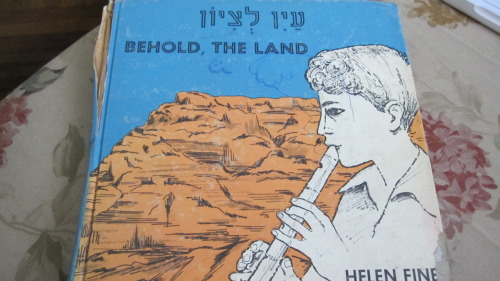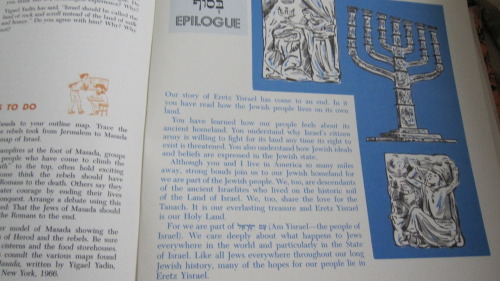You are now entering the Jewish Currents archive.
No Home Library is Complete Without Vintage Biased Hebrew School Textbooks
Alyssa Goldstein
July 21, 2012
by Alyssa Goldstein
My house is filled with books. There are probably about 3,000 of them, accumulated by my family over decades. The result is that I often find some really awesome stuff buried away on some dusty bookshelves. That’s how I came across Behold, The Land by Helen Fine, a 1968 social studies textbook on Israel for use in American Hebrew schools. It’s a look back in time to the very beginning of the Occupation.
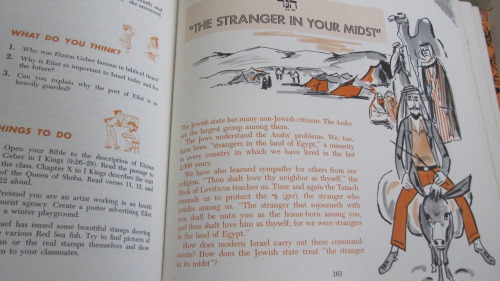 Most of the book is devoted to Israel’s Jewish population (an illustration shows us Yemeni Jews flying on a magic carpet, for example) but I was most interested to see the depiction of Palestinians. Here we see a section called “The Stranger in your Midst,” featuring some friendly-looking “Arabs.” Fine tells us that “The Jews understand the Arabs’ problem.” Of course, not all Arabs are so friendly-looking, like these scary fellows:
Most of the book is devoted to Israel’s Jewish population (an illustration shows us Yemeni Jews flying on a magic carpet, for example) but I was most interested to see the depiction of Palestinians. Here we see a section called “The Stranger in your Midst,” featuring some friendly-looking “Arabs.” Fine tells us that “The Jews understand the Arabs’ problem.” Of course, not all Arabs are so friendly-looking, like these scary fellows:
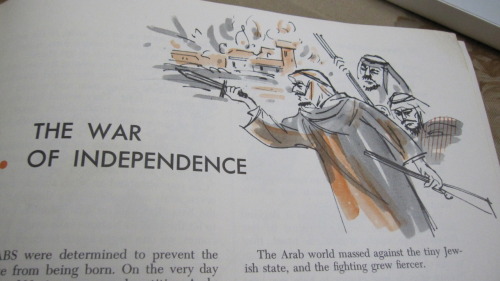 The book’s account of the 1948 war is a relic of a time when the traditional Zionist narrative reigned supreme. There is no Nakba to be found in these pages; all the Palestinians supposedly left of their own accord:
The book’s account of the 1948 war is a relic of a time when the traditional Zionist narrative reigned supreme. There is no Nakba to be found in these pages; all the Palestinians supposedly left of their own accord:
 But wait a second, what’s this? Is Fine turning around and saying that the Jewish people DID drive the Palestinians out of their land? Probably not. The text makes no distinctions between Palestinians, Trans-Jordanians, Syrians, Iraqis and Egyptians. All are simply grouped under the term “Arab.” Of course, this makes any understanding of actual historical events nearly impossible. Since the text’s goal appears to be instilling a sense of pride in young Hebrew school students as opposed to imparting, I don’t know, knowledge, Israel’s miraculous victory against an amorphous, faceless sea of Arabs suits the narrative better.
But wait a second, what’s this? Is Fine turning around and saying that the Jewish people DID drive the Palestinians out of their land? Probably not. The text makes no distinctions between Palestinians, Trans-Jordanians, Syrians, Iraqis and Egyptians. All are simply grouped under the term “Arab.” Of course, this makes any understanding of actual historical events nearly impossible. Since the text’s goal appears to be instilling a sense of pride in young Hebrew school students as opposed to imparting, I don’t know, knowledge, Israel’s miraculous victory against an amorphous, faceless sea of Arabs suits the narrative better.
 So after Israel’s victory in 1948, how did the country’s remaining Palestinians react? They were extremely grateful to be shown the light of modernity, of course. Jewish Israelis were more than happy to take up the white man’s burden and lead their Palestinian brethren out of their backwards squalor.
So after Israel’s victory in 1948, how did the country’s remaining Palestinians react? They were extremely grateful to be shown the light of modernity, of course. Jewish Israelis were more than happy to take up the white man’s burden and lead their Palestinian brethren out of their backwards squalor.
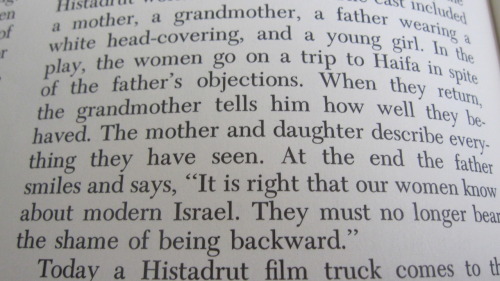 But what about the contemporary time? What should Israel do with the Palestinians in the territory it conquered? Make the desert bloom with the help of the Occupation.
But what about the contemporary time? What should Israel do with the Palestinians in the territory it conquered? Make the desert bloom with the help of the Occupation.
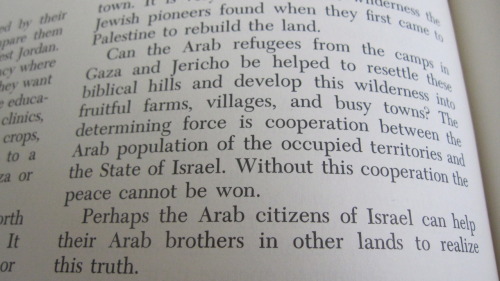 I wonder what how the people who used this textbook as kids turned out, and whether they still accept the narrative it taught them. It would be quite the feat to overcome that level of childhood indoctrination. If these poor kids didn’t get the point from the rest of the book, there’s still the epilogue to hammer it into their brains.
I wonder what how the people who used this textbook as kids turned out, and whether they still accept the narrative it taught them. It would be quite the feat to overcome that level of childhood indoctrination. If these poor kids didn’t get the point from the rest of the book, there’s still the epilogue to hammer it into their brains.
 Most of the book is devoted to Israel’s Jewish population (an illustration shows us Yemeni Jews flying on a magic carpet, for example) but I was most interested to see the depiction of Palestinians. Here we see a section called “The Stranger in your Midst,” featuring some friendly-looking “Arabs.” Fine tells us that “The Jews understand the Arabs’ problem.” Of course, not all Arabs are so friendly-looking, like these scary fellows:
Most of the book is devoted to Israel’s Jewish population (an illustration shows us Yemeni Jews flying on a magic carpet, for example) but I was most interested to see the depiction of Palestinians. Here we see a section called “The Stranger in your Midst,” featuring some friendly-looking “Arabs.” Fine tells us that “The Jews understand the Arabs’ problem.” Of course, not all Arabs are so friendly-looking, like these scary fellows:
 The book’s account of the 1948 war is a relic of a time when the traditional Zionist narrative reigned supreme. There is no Nakba to be found in these pages; all the Palestinians supposedly left of their own accord:
The book’s account of the 1948 war is a relic of a time when the traditional Zionist narrative reigned supreme. There is no Nakba to be found in these pages; all the Palestinians supposedly left of their own accord:


 But what about the contemporary time? What should Israel do with the Palestinians in the territory it conquered? Make the desert bloom with the help of the Occupation.
But what about the contemporary time? What should Israel do with the Palestinians in the territory it conquered? Make the desert bloom with the help of the Occupation.
 I wonder what how the people who used this textbook as kids turned out, and whether they still accept the narrative it taught them. It would be quite the feat to overcome that level of childhood indoctrination. If these poor kids didn’t get the point from the rest of the book, there’s still the epilogue to hammer it into their brains.
I wonder what how the people who used this textbook as kids turned out, and whether they still accept the narrative it taught them. It would be quite the feat to overcome that level of childhood indoctrination. If these poor kids didn’t get the point from the rest of the book, there’s still the epilogue to hammer it into their brains.
It always pays to rummage around on your bookshelf.“You have learned how our people feels about its ancient homeland. You understand why Israel’s citizen army is willing to fight for its land any time its right to exist is threatened. You also understand how Jewish ideals and beliefs are expressed in the Jewish state. Although you and I live in America so many miles away, strong bonds join us to the Jewish homeland for we are part of the Jewish people. We, too, are descendants of the ancient Israelites who lived on the historic soil of the land of Israel. We, too, share the love for the Tanach. It is our everlasting treasure and Eretz Yisrael is our holy land. For we are part of Am Yisrael. We care deeply about what happens to Jews everywhere in the world and particularly in the State of Israel. Like all Jews everywhere throughout our long Jewish history, many of the hopes for our people lie in Eretz Yisrael.
